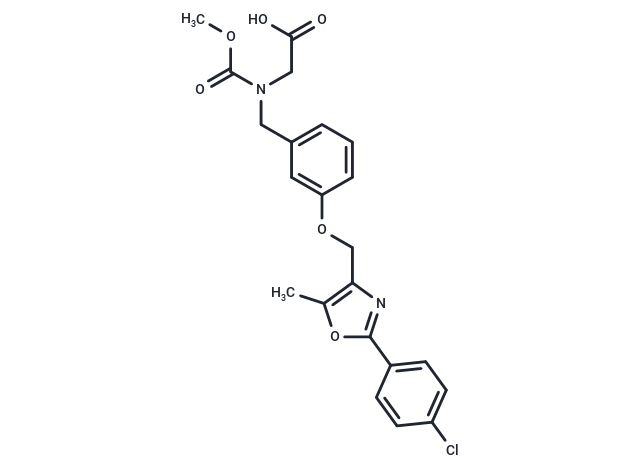Shopping Cart
- Remove All
 Your shopping cart is currently empty
Your shopping cart is currently empty

BMS-687453 is a potent and selective PPAR alpha agonist, demonstrating an EC(50) of 10 nM for human PPAR alpha and approximately 410-fold selectivity versus human PPAR gamma in PPAR-GAL4 transactivation assays.

| Pack Size | Price | Availability | Quantity |
|---|---|---|---|
| 1 mg | $39 | In Stock | |
| 2 mg | $55 | In Stock | |
| 5 mg | $89 | In Stock | |
| 10 mg | $147 | In Stock | |
| 25 mg | $297 | In Stock | |
| 50 mg | $455 | In Stock | |
| 100 mg | $689 | In Stock | |
| 1 mL x 10 mM (in DMSO) | $98 | In Stock |
| Description | BMS-687453 is a potent and selective PPAR alpha agonist, demonstrating an EC(50) of 10 nM for human PPAR alpha and approximately 410-fold selectivity versus human PPAR gamma in PPAR-GAL4 transactivation assays. |
| Targets&IC50 | PPARα (human):260 nM |
| In vitro | BMS-687453 is PPARα agonist, with an EC50 and IC50 of 10 nM and 260 nM for human PPARα and ~410-fold and more than 57-fold selectivity vs human PPARγ of 4100 nM and >15000 nM in PPAR-GAL4 transactivation assays. BMS-687453 exhibits high PPARα potency (EC50: 47 nM) with ~50-fold selectivity vs PPARγ (EC50: 2400 nM) in HepG2 cells. However, BMS-687453 shows less potent activities in rodent PPARα functional assays, with a moderate EC50 of 426 nM for mouse and 488 nM for hamster but remains a full PPARα agonist in both species [1]. |
| In vivo | BMS 687453 (10-100 mg/kg) reduces plasma triglyceride levels and increases HDL levels in human ApoA1 transgenic mice. It also reduces serum triglyceride and LDL levels in hamsters fed a high-fat diet[2] |
| Kinase Assay | A homogeneous, fluorescent polarization PPARR and PPARγ binding assay was used as the primary screen for determining the PPARR and PPARγ binding affinity of compounds. The human functional activity of PPARR and PPARγ agonists was determined by using the GAL4-LBD assays as previously described. The in vitro hamster, rat, and mouse PPARR functional activities were tested in the chimeric GAL4/PPARR assay format described for human PPARR as above. The data are reported as an EC50 value calculated using XLfit 4 parameter fit and floating all parameters. Full-length human PPARR and PPARγ co-transfection assays in HepG2 cells were employed for further testing the leading compounds (BMS-687453) [1]. |
| Animal Research | Male Syrian golden hamsters were acclimated to 12 h light/dark reverse light cycle for 7 days with high fat diet, then dosed daily by oral gavage for 21 days while on the same diet. At the end of the experiment, blood samples were drawn retro-orbitally after an 18 h fast and 24 h after the last dose for the determination of serum lipid levels. Livers were dissected out for mRNA analysis [1]. |
| Molecular Weight | 444.86 |
| Formula | C22H21ClN2O6 |
| Cas No. | 1000998-59-3 |
| Smiles | COC(=O)N(CC(O)=O)Cc1cccc(OCc2nc(oc2C)-c2ccc(Cl)cc2)c1 |
| Relative Density. | 1.342 g/cm3 (Predicted) |
| Storage | Powder: -20°C for 3 years | In solvent: -80°C for 1 year | Shipping with blue ice. | ||||||||||||||||||||||||||||||
| Solubility Information | DMSO: 31 mg/mL (69.68 mM), Sonication is recommended. | ||||||||||||||||||||||||||||||
Solution Preparation Table | |||||||||||||||||||||||||||||||
DMSO
| |||||||||||||||||||||||||||||||

Copyright © 2015-2025 TargetMol Chemicals Inc. All Rights Reserved.